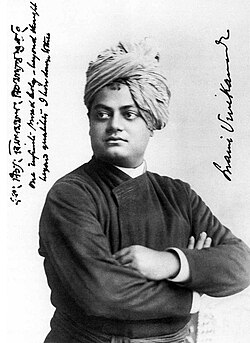
Back Swami Vivekananda Afrikaans Vivekananda ALS سوامي فيفي كاناندا Arabic سوامى بيبيكاناندا ARZ স্বামী বিবেকানন্দ Assamese Swami Vivekananda AST स्वामी विवेकानन्द AWA Vivekananda Azerbaijani Вивекананда Bashkir Свами Вивекананда Bulgarian
Vivekananda | |
|---|---|
Svāmī Vivekānanda | |
 Vivekananda in Chicago, September 1893. In note on the left Vivekananda wrote: "One infinite pure and holy – beyond thought beyond qualities I bow down to thee".[1] | |
| Personal life | |
| Born | Narendranath Datta 12 January 1863 |
| Died | 4 July 1902 (aged 39) |
| Citizenship | British subject |
| Era | Modern philosophy |
| Region | Eastern philosophy |
| Alma mater | University of Calcutta (BA) |
| Signature | |
| Religious life | |
| Religion | Hinduism |
| Founder of | |
| Philosophy | Advaita Vedanta[2][3] Rāja Yoga[3] |
| School | |
| Lineage | Daśanāmi Sampradaya |
| Religious career | |
| Guru | Ramakrishna |
Influenced by | |
"Arise, awake, and stop not till the goal is reached"
(more on Wikiquote)
Swami Vivekananda (/ˈswɑːmi ˌvɪveɪˈkɑːnəndə/)[a] (12 January 1863 – 4 July 1902), born Narendranath Datta[b], was an Indian Hindu monk, philosopher, author, religious teacher, and the chief disciple of the Indian mystic Ramakrishna.[4][5] Vivekananda was a major figure in the introduction of Vedanta and Yoga to the Western world,[6][7][8] and is credited with raising interfaith awareness and elevating Hinduism to the status of a major world religion.[9]
Born into an aristocratic Bengali Kayastha family in Calcutta (now Kolkata), Vivekananda showed an early inclination towards religion and spirituality. At the age of 18, he met Ramakrishna and became his devoted disciple, and later took up the vows of a sannyasin (renunciate). Following Ramakrishna’s death, Vivekananda travelled extensively across the Indian subcontinent as a wandering monk, gaining first-hand knowledge of the often harsh living conditions endured by the Indian masses under then British India, he sought a way to alleviate their suffering by establishing social services but lacked capital. In 1893, he travelled to the United States to participate in the Parliament of the World's Religions in Chicago, where he delivered a landmark speech beginning with the words "Sisters and brothers of America...". His powerful message introduced Hindu spiritual thought and advocated for both religious tolerance and universal acceptance.[10][11] The speech made a profound impression; an American newspaper described him as "an orator by divine right and undoubtedly the greatest figure at the Parliament".[12]
Following his success in Chicago, Vivekananda lectured widely across the United States, the United Kingdom, and continental Europe, disseminating the essential principles of Hindu philosophy. He established the Vedanta Society of New York and the Vedanta Society of San Francisco (now the Vedanta Society of Northern California),[13] both of which became the foundations for later Vedanta Societies in the West. In India, he founded the Ramakrishna Math, a monastic order for spiritual training, and the Ramakrishna Mission, dedicated to social services, education, and humanitarian work.[7]
Vivekananda is widely regarded as one of the greatest modern Indian thinkers. He was a prominent philosopher, social reformer, and the most successful proponent of Vedanta philosophy abroad. He played a crucial role in the Hindu revivalist movement and contributed significantly to the rise and development of Indian nationalism in colonial India.[14] Celebrated as a patriotic saint, his birth anniversary is observed in India as National Youth Day.[15][16]
- ^ "World fair 1893 circulated photo". vivekananda.net. Archived from the original on 24 December 2023. Retrieved 6 October 2024.
- ^ "Bhajanānanda (2010), Four Basic Principles of Advaita Vedanta, p.3" (PDF). Retrieved 28 December 2019.
- ^ a b De Michelis 2005.
- ^ "Swami Vivekananda: A short biography". OneIndia. Retrieved 3 May 2017.
- ^ "Life History & Teachings of Swami Vivekanand". Archived from the original on 9 May 2017. Retrieved 3 May 2017.
- ^ "International Yoga Day: How Swami Vivekananda helped popularise the ancient Indian regimen in the West". The Indian Express. 21 June 2017.
- ^ a b Feuerstein 2002, p. 600.
- ^ Syman, Stefanie (2010). The Subtle Body: The Story of Yoga in America. New York: Farrar, Straus, and Giroux. p. 59. ISBN 978-0-374-23676-2.
- ^ Clarke 2006, p. 209.
- ^ Barrows, John Henry (1893). The World's Parliament of Religions. The Parliament of Religions Publishing Company. p. 101.
- ^ Dutt 2005, p. 121.
- ^ "Sisters and brothers of America — full text of Swami Vivekananda's iconic Chicago speech". ThePrint. 4 July 2019.
- ^ Jackson 1994, p. 115.
- ^ Von Dense 1999, p. 191.
- ^ "Know About Swami Vivekananda on National Youth Day 2022". SA News Channel. 11 January 2022. Retrieved 12 January 2022.
- ^ "National Youth Day 2022: Images, Wishes, and Quotes by Swami Vivekananda That Continue to Inspire us Even Today!". News18. 12 January 2022. Retrieved 12 January 2022.
Cite error: There are <ref group=lower-alpha> tags or {{efn}} templates on this page, but the references will not show without a {{reflist|group=lower-alpha}} template or {{notelist}} template (see the help page).
© MMXXIII Rich X Search. We shall prevail. All rights reserved. Rich X Search